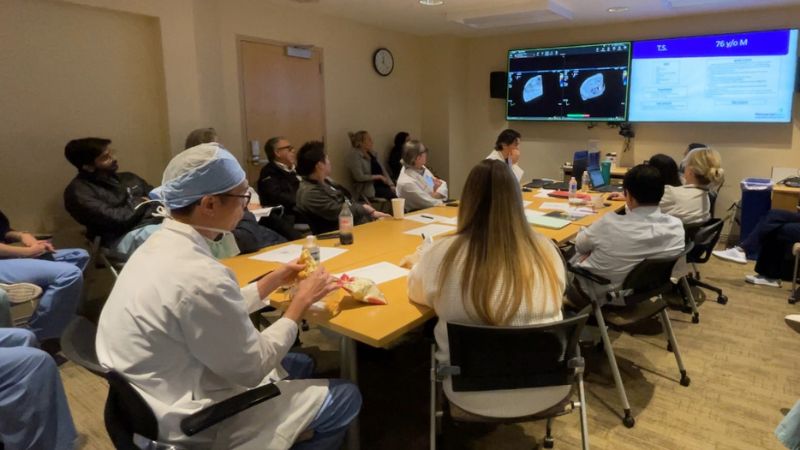MemorialCare Heart & Vascular Institute at Long Beach Medical Center plays a unique role in treating valve disease patients not often seen at community hospitals, but rather primarily in academic affiliated settings. At Long Beach Medical Center, a multi-disciplinary team including community cardiologists, cardiac surgeons, cardiac interventionalists, cardiac imaging specialists, nurse practitioners and fellows, meet weekly to patient’s clinical history along with all the tests and images necessary to determine the best course of treatment for each individual.
Whether it’s an emergency life-threatening condition or a planned procedure, both in some instances can be performed using a minimally invasive approach. Those minimally invasive procedures can be done both surgically and with catheter-based technology.
“In reviewing every case, we strive to identify which minimally invasive approach will give the patient the best outcome and improved quality of life,” says Marc Sakwa, M.D., chief of cardiovascular surgery, MemorialCare Heart & Vascular Institute; medical director, adult cardiovascular surgery, MemorialCare Heart & Vascular Institute at Long Beach Medical Center. “With most of our heart patients, the Long Beach team collaborates to create an individualized plan of care.”
Minimally invasive cardiac surgery is a highly effective approach for treating heart valve disease, particularly in younger adults, where the repair will often last decades. This technique offers several advantages, including smaller incisions, reduced trauma to surrounding tissues, and quicker recovery times compared to traditional open-heart surgery. Minimally invasive procedures may result in longer-lasting outcomes, potentially reducing the need for further revision surgeries in the future.
“The majority of our valve procedures at Long Beach Medical Center are done using minimally invasive techniques,” says Dr. Sakwa. “Surgery is performed through small incisions in the chest without opening the breastbone. This allows young, older, and even very sick patients a quicker recovery, reduced hospital stays and early return to life activities.”
An alternative treatment option for heart valve disease is through an interventional approach, in which the team accesses the heart by inserting a small catheter in the groin or arm and moves it to the diseased valve. The team injects contrast material which allows the team to identify the site and perform the procedure. This is often a good alternative for older patients who may not be strong enough for surgery.
“Benefits of an interventional approach include a quicker recovery time, less scarring, diminished postoperative pain, and a shorter hospital stay, enabling patients to resume their daily activities sooner,” says David Shavelle, M.D., chief of cardiology, MemorialCare Heart & Vascular Institute; medical director, Adult Cardiology & Interventional Lab, MemorialCare Heart & Vascular Institute, Long Beach Medical Center. “This is especially significant for high-risk patients who might not be able to handle open-heart surgery due to age, underlying health issues, or frailty.”
Long Beach Medical Center is a leader in research and innovative minimally invasive approaches to repair any cardiac disease. It has been named by Healthgrades® as a Five-Star Recipient for Treatment of Heart Failure for 2 Years in a Row (2023-2024) and scored high performance rankings for Congestive Heart Failure and Heart Attack by U.S. News & World Report.
Want to learn more about minimally invasive heart treatments? visit memorialcare.org/lbheart.


